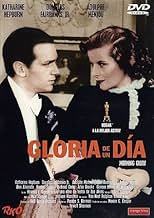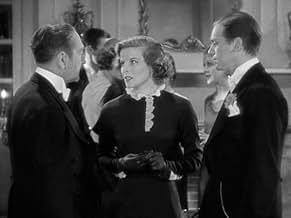CALIFICACIÓN DE IMDb
6.4/10
3.4 k
TU CALIFICACIÓN
Agrega una trama en tu idiomaWhen a naively innocent, aspiring actress arrives on the Broadway scene, she is taken under the wing of several theater veterans who mentor her to ultimate success.When a naively innocent, aspiring actress arrives on the Broadway scene, she is taken under the wing of several theater veterans who mentor her to ultimate success.When a naively innocent, aspiring actress arrives on the Broadway scene, she is taken under the wing of several theater veterans who mentor her to ultimate success.
- Ganó 1 premio Óscar
- 1 premio ganado en total
Fred Santley
- Will Seymour
- (as Fredric Santly)
Robert Adair
- Roberts
- (sin créditos)
Ralph Bard
- Head Usher
- (sin créditos)
Billy Bletcher
- Actor
- (sin créditos)
Robert Bolder
- Actor
- (sin créditos)
John Carradine
- Dream Apparition
- (sin créditos)
Louise Carver
- Miss Waterman
- (sin créditos)
Helene Chadwick
- Miss Murray
- (sin créditos)
- Dirección
- Guionistas
- Todo el elenco y el equipo
- Producción, taquilla y más en IMDbPro
Argumento
¿Sabías que…?
- TriviaKatharine Hepburn and Douglas Fairbanks Jr. performed the balcony scene from "Romeo and Juliet" in costume, but it was not used in the picture.
- ErroresWhen a newspaper clipping is shown on screen, the Broadway impresario's name in the article is Lewis Easton. In the end credits, the character's name is Louis Easton.
- Citas
Gwendolyn Hall: My! You're gaining weight.
Rita Vernon: Yes. I'll soon be your size, my dear!
- ConexionesEdited into Starring Katharine Hepburn (1981)
Opinión destacada
Historical accounts of the 1932-33 Academy Awards claim that there was only polite applause when the Best Actor and Best Actress awards were presented. Charles Laughton won Best Actor for his performance in "The Private Life of Henry VIII," and the guests at the awards ceremony were not pleased that the Academy chose a (gasp!) non-American. Katharine Hepburn won the Best Actress prize for her performance in "Morning Glory," and the tepid response to her win was due to the fact that the actress had already made herself unliked among Hollywood circles. Hepburn of course would go on to have perhaps the single most illustrious career ever for a movie star, and whether or not she was ever truly liked, she became one of the most revered and respected actresses in the business.
But based on her performance in "Morning Glory," it's easy to see why she turned people off. She's just weird. That weirdness was likely interpreted as unique, and she certainly delivers lines in the film in a way that no actress had delivered lines before her. I have to believe it's this uniqueness that won her the Oscar. But as a performance, it's pretty dreadful, though the movie around her is such an afterthought that I don't know that anyone could have done much with it.
Hepburn plays Eva Lovelace, a naive, stagestruck kid who comes to New York with ambitions to be a serious actress and annoys everyone so much that they just give in and give her her big break even if there's no logical reason for doing so. (I'm sure that's how the show business world really works). I don't know whether to blame the writing, directing, or Hepburn herself, but Eva comes across as mentally unhinged rather than innocent, and the film gives us no conceivable reason that a theater impresario (Adolphe Menjou) and a renowned playwright (Douglas Fairbanks, Jr.) would be so infatuated with her, let alone allow her to just sit around their offices and homes all the time while they go about their business. Despite being innocent and haughty and above it all, she falls into bed easily with Menjou and then becomes obsessed with him, until the end when, on a dime, she pivots and realizes that she's a woman scorned. Nothing in this movie makes narrative sense, and you want to see Hepburn punched in the face more than you want to see her character make it on Broadway.
I had the most fun with Mary Duncan, an actress I'd never heard of, who plays a Broadway diva, and I was struck with how much sex appeal Douglas Fairbanks had. Why on earth Hepburn's character didn't fall for him instead of Menjou is just one of the nonsensical plot developments this film wants us to swallow.
Grade: C-
But based on her performance in "Morning Glory," it's easy to see why she turned people off. She's just weird. That weirdness was likely interpreted as unique, and she certainly delivers lines in the film in a way that no actress had delivered lines before her. I have to believe it's this uniqueness that won her the Oscar. But as a performance, it's pretty dreadful, though the movie around her is such an afterthought that I don't know that anyone could have done much with it.
Hepburn plays Eva Lovelace, a naive, stagestruck kid who comes to New York with ambitions to be a serious actress and annoys everyone so much that they just give in and give her her big break even if there's no logical reason for doing so. (I'm sure that's how the show business world really works). I don't know whether to blame the writing, directing, or Hepburn herself, but Eva comes across as mentally unhinged rather than innocent, and the film gives us no conceivable reason that a theater impresario (Adolphe Menjou) and a renowned playwright (Douglas Fairbanks, Jr.) would be so infatuated with her, let alone allow her to just sit around their offices and homes all the time while they go about their business. Despite being innocent and haughty and above it all, she falls into bed easily with Menjou and then becomes obsessed with him, until the end when, on a dime, she pivots and realizes that she's a woman scorned. Nothing in this movie makes narrative sense, and you want to see Hepburn punched in the face more than you want to see her character make it on Broadway.
I had the most fun with Mary Duncan, an actress I'd never heard of, who plays a Broadway diva, and I was struck with how much sex appeal Douglas Fairbanks had. Why on earth Hepburn's character didn't fall for him instead of Menjou is just one of the nonsensical plot developments this film wants us to swallow.
Grade: C-
- evanston_dad
- 19 sep 2019
- Enlace permanente
Selecciones populares
Inicia sesión para calificar y agrega a la lista de videos para obtener recomendaciones personalizadas
- How long is Morning Glory?Con tecnología de Alexa
Detalles
- Fecha de lanzamiento
- País de origen
- Idioma
- También se conoce como
- Morning Glory
- Locaciones de filmación
- Times Square, Manhattan, Nueva York, Nueva York, Estados Unidos(establishing shot, archive footage)
- Productora
- Ver más créditos de la compañía en IMDbPro
Taquilla
- Presupuesto
- USD 239,000 (estimado)
- Tiempo de ejecución1 hora 14 minutos
- Color
- Relación de aspecto
- 1.37 : 1
Contribuir a esta página
Sugiere una edición o agrega el contenido que falta

Principales brechas de datos
By what name was Mañana de gloria (1933) officially released in Canada in English?
Responda
























